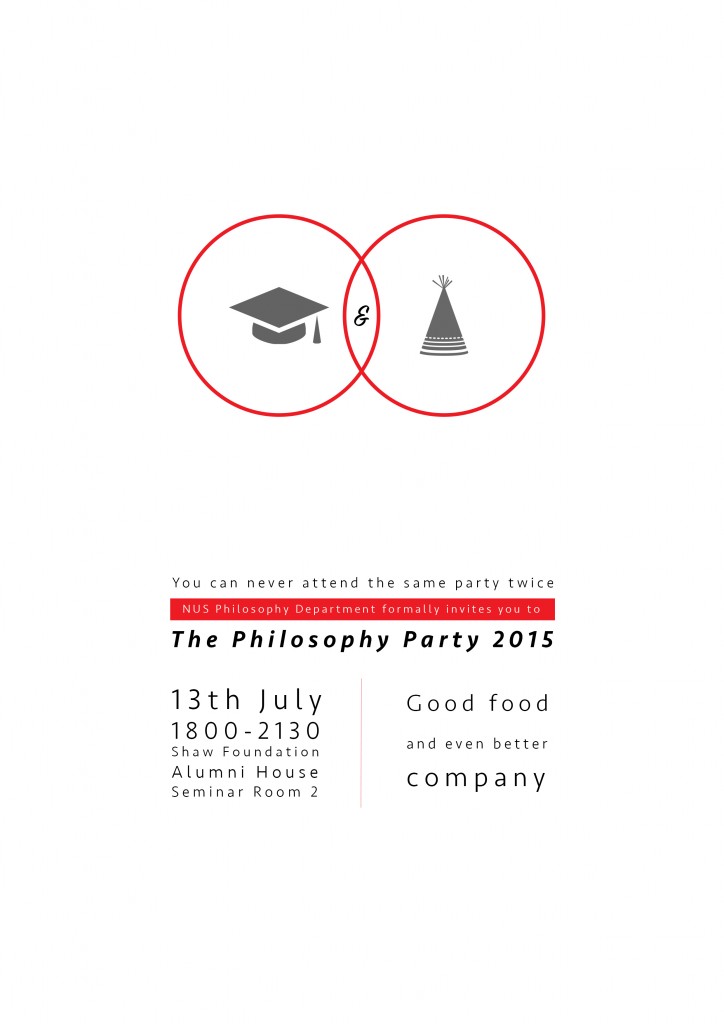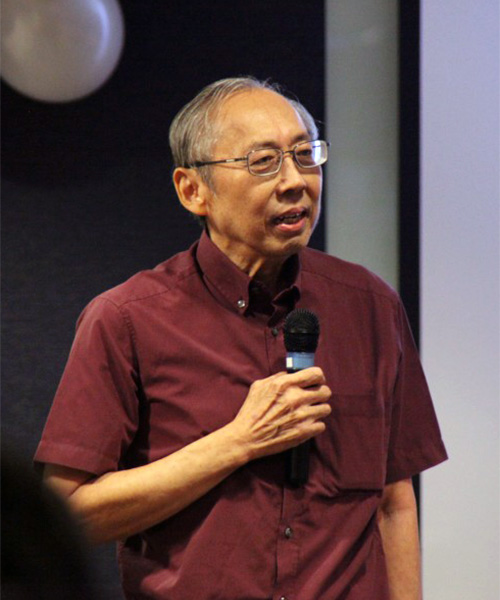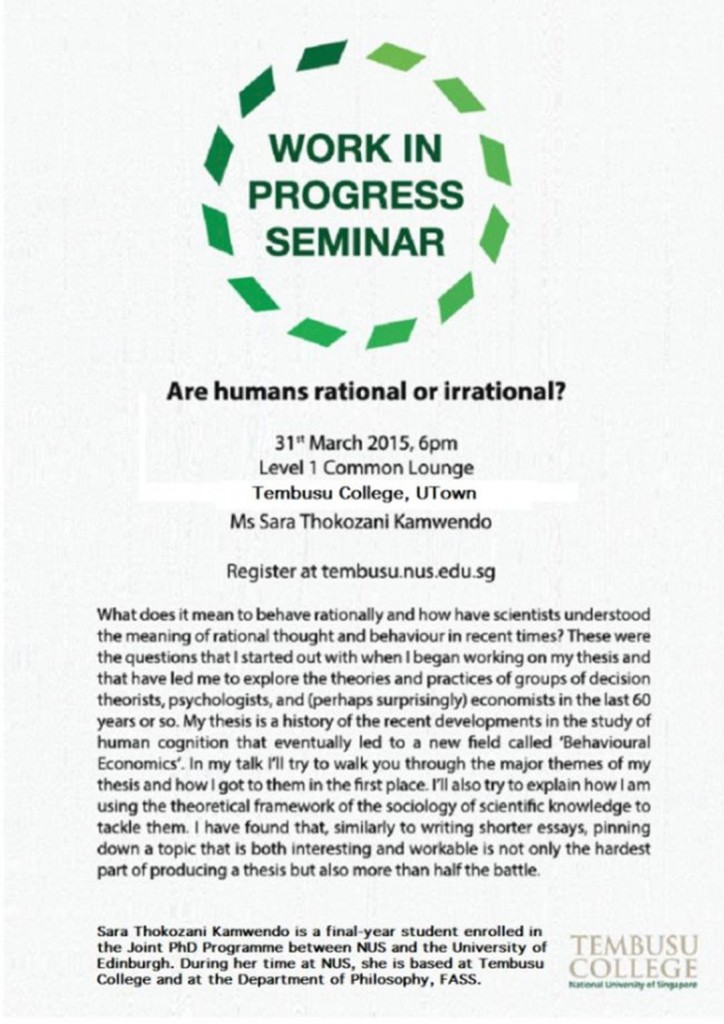Author Archives: Nicholas Cai
Professor Ten Chin Liew awarded Emeritus Professorship by NUS
The Department of Philosophy proudly and heartily congratulates Professor Ten Chin Liew on being conferred the title of Emeritus Professor by NUS.
Professor Ten has accumulated over 25 years of service to the University, including 6½ years as Head of the Department of Philosophy, and countless hours as a dedicated and inspiring teacher and supervisor. He is widely recognized as one of the world’s leading authorities on the political philosophy of J.S. Mill, and has contributed nationally in the areas of bioethics and laboratory animal research. Professor Ten’s ideas have influenced the likes of H.L.A. Hart (the preeminent legal philosopher of the 20th century), Joseph Raz (arguably the most important living legal philosopher), Nigel Walker (the great British criminologist), and Wayne Sumner (the distinguished Canadian legal and political philosopher). He has been a Fellow of the Australian Academy of the Humanities since 1989, and of the Academy of Social Sciences since 2000.
On this occasion the faculty, staff, and students of the Philosophy department, both current and former, would like to express our deep gratitude to Professor Ten for his invaluable contributions. We join the University in honoring an outstanding alumnus, who is also a cherished colleague, mentor and friend.
Note: The title of Emeritus Professor is conferred on a professor who is on or near retirement in recognition of the professor’s sustained contributions in terms of distinguished scholarship and conspicuous service to the University. (NUS University Statutes and Regulations, Regulation 8)
Hume Workshop (Apr 30)
“Bradley, Hume, and Identity-in-Difference” by Donald L. M. Baxter (2.00-3.15pm)
In Appearance and Reality Bradley refers to what he calls “the old dilemma”: that attributions of identity are either so tautologous as to fail to be judgments, or are contradictions. Bradley’s approach is to appeal to identity-in-difference. “It takes two to make the same.” We nowadays will hear such claims in a Fregean way and will hear Bradley as failing to distinguish the truth of an identity statement from its informativeness. I suggest rather that we hear Bradley’s claim in a Humean way. Hume gave a compelling argument for identity-in-difference, though not in those terms. He raises a problem that cannot be understood nor addressed in the Fregean way, that is very like Bradley’s old dilemma. I’ve called it “Hume’s Difficulty concerning Identity.” How can we conceive there to be a single thing, on the one hand, and several distinct things, on the other, that are somehow identical? In a previous discussion of Bradley, I’ve called this same problem the “Problem of Complex-Unities.” Both Bradley and Hume thought a solution that did not conceal some contradiction was impossible. I myself think that Hume’s presentation of the problem suggests a genuine solution along the lines of my theories of Many-One Identity and of Aspects. For now, though, I just want us to hear Bradley’s old dilemma in a Humean way.
“Why Distinctions of Reason are a Real Problem for Hume’s Separability Principle” by Hsueh Ming Qu (3.30-4.45pm)
Commentators such as Kemp Smith (1941, p.256), Mendelbaum (1974, p.246), and Bricke (1980, p.71) have taken the distinctions of reason to pose either a counterexample to or a limitation of scope on the Separability Principle, a suggestion that has been convincingly addressed by various accounts such as Garrett (1997), Hoffman (2011), and Baxter (2011). However, I argue in this paper that there are two notions of ‘distinction of reason’, one between particular instantiations (token distinctions of reason) and one between general ideas (type distinctions of reason). Discussion of the distinctions of reason in the secondary literature has without fail focused on token distinctions of reason, but I will argue that type distinctions of reason prove problematic for Hume’s Separability Principle. In the end, I find a way around this problem that is consonant with Hume’s account of general ideas, but which can hardly be said to be an account which he explicitly or even implicitly endorsed.
“The Concealed Operations of Custom: Hume’s Treatise From The Inside Out” by Jay Garfield (5.00-5.45pm)
I am about to start work on a book of this title. I want to share with you the guiding principles that motivate my reading of Hume in that book and the way they will inform my interpretation of Hume’s project. This is not even work-in-progress; it is work-in-imagination. So, I am looking for advice.
About the Speakers:
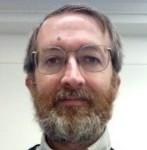 Donald L. M. Baxter is Professor and Department Head in the Department of Philosophy at the University of Connecticut. He received his Ph.D. from the University of Pittsburgh in 1984. He works in Metaphysics and Early Modern Western Philosophy. His monograph is Hume’s Difficulty: Time and Identity in the Treatise (Routledge 2008). He recently co-edited with Aaron J. Cotnoir an anthology on the metaphysics of parts and wholes entitled Composition as Identity (Oxford University Press 2014).
Donald L. M. Baxter is Professor and Department Head in the Department of Philosophy at the University of Connecticut. He received his Ph.D. from the University of Pittsburgh in 1984. He works in Metaphysics and Early Modern Western Philosophy. His monograph is Hume’s Difficulty: Time and Identity in the Treatise (Routledge 2008). He recently co-edited with Aaron J. Cotnoir an anthology on the metaphysics of parts and wholes entitled Composition as Identity (Oxford University Press 2014).
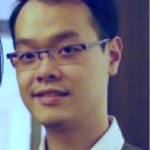 Hsueh Qu joined the Philosophy Department at NUS in 2015. Previously, he received his Ph.D. from New York University, and completed his undergraduate and B.Phil. at Oxford University. He is originally from Malaysia. His research interest is Early Modern, primarily the scholarship of David Hume; he also has interests in Kant, Ethics, and Metaphysics. In this, as in all his other endeavors, he asks you to forgive him his failings, for he is only Humean after all.
Hsueh Qu joined the Philosophy Department at NUS in 2015. Previously, he received his Ph.D. from New York University, and completed his undergraduate and B.Phil. at Oxford University. He is originally from Malaysia. His research interest is Early Modern, primarily the scholarship of David Hume; he also has interests in Kant, Ethics, and Metaphysics. In this, as in all his other endeavors, he asks you to forgive him his failings, for he is only Humean after all.
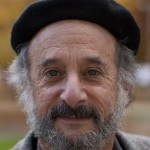 Jay L Garfield is Kwan Im Thong Hood Cho Professor of Humanities and Head of Studies in Philosophy at Yale-NUS College, Professor of Philosophy at the National University of Singapore, Recurrent Visiting Professor of Philosophy at Yale University, Doris Silbert Professor in the Humanities and Professor of Philosophy at Smith College, Professor of Philosophy at Melbourne University and Adjunct Professor of Philosophy at the Central University of Tibetan Studies. He earned his PhD in Philosophy at the University of Pittsburgh. Garfield’s most recent books are Engaging Buddhism: Why It Matters to Philosophy (2015), Madhyamaka and Yogācāra: Allies or Rivals (with Jan Westerhoff 2015), The Moon Points Back: Buddhism, Logic and Analytic Philosophy (with Yasuo Deguchi, Graham Priest and Koji Tanaka 2015), Moonpaths: Ethics in the Context of Conventional Truth (with the Cowherds 2015) and Western Idealism and its Critics (2011). His book Examination of the Percept: Dignāga’s Alaṃbanāparikṣā and its Commentaries (with Douglas Duckworth M David Eckel, Yeshes Thabkhas and Sonam Thakchöe) is under review and his book with Nalini Bhushan on Minds Without Fear: Philosophy in the Indian Renaissance is under contract. His next big project is a book on Hume’s Treatise to be called The Concealed Operations of Custom: Hume’s Treatise From The Inside Out.
Jay L Garfield is Kwan Im Thong Hood Cho Professor of Humanities and Head of Studies in Philosophy at Yale-NUS College, Professor of Philosophy at the National University of Singapore, Recurrent Visiting Professor of Philosophy at Yale University, Doris Silbert Professor in the Humanities and Professor of Philosophy at Smith College, Professor of Philosophy at Melbourne University and Adjunct Professor of Philosophy at the Central University of Tibetan Studies. He earned his PhD in Philosophy at the University of Pittsburgh. Garfield’s most recent books are Engaging Buddhism: Why It Matters to Philosophy (2015), Madhyamaka and Yogācāra: Allies or Rivals (with Jan Westerhoff 2015), The Moon Points Back: Buddhism, Logic and Analytic Philosophy (with Yasuo Deguchi, Graham Priest and Koji Tanaka 2015), Moonpaths: Ethics in the Context of Conventional Truth (with the Cowherds 2015) and Western Idealism and its Critics (2011). His book Examination of the Percept: Dignāga’s Alaṃbanāparikṣā and its Commentaries (with Douglas Duckworth M David Eckel, Yeshes Thabkhas and Sonam Thakchöe) is under review and his book with Nalini Bhushan on Minds Without Fear: Philosophy in the Indian Renaissance is under contract. His next big project is a book on Hume’s Treatise to be called The Concealed Operations of Custom: Hume’s Treatise From The Inside Out.
ALL ARE WELCOME
RI Inter-School Philosophy Dialogue: SG50 Edition (July 11*)
The Philosophy Department of Raffles Institution has been organising an annual inter-school philosophy dialogue for secondary school students for the past 11 years. The dialogue session have students engaging one another in small group discussions based on a variety of stimuli revolving around a number of philosophical themes. These discussion sessions are facilitated by teachers who are teaching philosophy in schools across Singapore, many of them alumni of NUS Philosophy. This year, in the spirit of SG50 and NUS 110, the Department of Philosophy, NUS, is sponsoring the event, with the aim of nurturing the art of philosophical discussion, as well as connecting with our alumni members at the event.
Event: Inter-School Philosophy Dialogue: SG50 Edition
Date: 11 July 2015 (Sat)*
Time: 8.00 am – 12.30 pm*
Venue: Raffles Institution (Year 1 – 4 campus)
*Edited: please note amended date and time of above event
“On Putnam’s Account of the Precondition of Reference” by Tay Qing Lun (Apr 7)
In ‘Brains in a Vat’, Hilary Putnam argues that causal relations are a precondition of reference, and granted this point, the falsity of certain kinds of skeptical scenarios follow. I argue that his thesis is problematic, as it leads to an unacceptable conclusion: mathematical claims will end up false. Following that, I hope to show how some ways of salvaging his thesis may work, but only at the cost of his thesis’s anti-skeptical force.
Graduate Seminar Series.
Date: Tuesday, 31 Mar 2015
Time: 3 pm – 4 pm
Venue: Philosophy Resource Room (AS3 #05-23)
Speaker: Tay Qing Lun
Moderator: Theresa Helke
About the Speaker:
 Qing Lun is pursuing his MA in NUS, where he is currently engaged in research on modal metaphysics.
Qing Lun is pursuing his MA in NUS, where he is currently engaged in research on modal metaphysics.
“A Kantian Case for Prioritizing the Least Well-Off” by Jade Lim (Apr 7)
In this talk, I argue that we sometimes have to prioritize the least well-off. In order to do so, I will apply Kant’s Formula of Universal Law that says, “Act only in accordance with that maxim through which you can at the same time will that it become a universal law.” I will show that we cannot will maxims that do not prioritize the least well-off as universal law and thus are not morally permitted to act in accordance with them. It then follows that we sometimes have to act against those maxims and prioritize the least well-off.
Graduate Seminar Series.
Date: Tuesday, 31 Mar 2015
Time: 2 pm – 3 pm
Venue: Philosophy Resource Room (AS3 #05-23)
Speaker: Jade Lim
Moderator: Koh Hui Li
About the Speaker:
 Jade’s main areas of research are in ethics and political philosophy. Her interests also extend to feminism, environmental ethics and race.
Jade’s main areas of research are in ethics and political philosophy. Her interests also extend to feminism, environmental ethics and race.
“On World-disclosure and the Difference Between Experiment and Exploration” by Sönke Ahrens (Apr 16)
In this presentation I would like to discuss why it is important to distinguish between the terms experiment and exploration as two forms of world disclosure. These terms are rarely systematically distinguished. Sometimes they are used as synonyms, sometimes in a hierarchical order when an experiment is described as a form or method of exploration. Sometimes experiment is understood as a rigorous method in the natural sciences and sometimes as a playful and untamed approach in the arts, as an exploration of possibilities. This confusion can be explained as an effect of an underlying paradox which comes into play when we think about the unknown and which is known best in the wording of Plato. Meno’s Paradox is that inquiry is either impossible or unnecessary as we either know what we are looking for, which would make inquiry unnecessary or that we do not know what we are looking for, which would make inquiry impossible. I suggest to understand this paradox as an empirical challenge for research and learning strategies and will argue that a better understanding about how scientists and learners explore and experiment empirically can help us to address epistemological challenges better theoretically. And that is by distinguishing clearly between experiment and exploration as two forms of world-disclosure. World-disclosure is a term borrowed from Heidegger and is used here as an attempt to conceptualize practical ways of dealing with this paradox in difference-theoretical terms. The other aim of this presentation is to explain what exactly that means.
Philosophy Seminar Series
Date: Thursday, 16 Apr 2015
Time: 2pm – 4pm
Venue: AS3 #05-23
Speaker: Sonke Ahrens
Moderator: Dr. Qu Hsueh Ming
About the Speaker:
 Sönke Ahrens works in the field of Philosophy of Education with a focus on epistemology. In the last two years he worked as a substitute Professor for Philosophy of Education at the University of the German Federal Armed Forces in Munich, Germany. His research draws from philosophy, sociology and cognitive psychology and is an attempt to understand the impact of social change for education from different angles. His main interest, however, lies in the development of a General Theory of World-Disclosure. The English translation of his doctoral thesis on this topic “Experiment and Exploration. Forms of World-Disclosure” was published with Springer last year.
Sönke Ahrens works in the field of Philosophy of Education with a focus on epistemology. In the last two years he worked as a substitute Professor for Philosophy of Education at the University of the German Federal Armed Forces in Munich, Germany. His research draws from philosophy, sociology and cognitive psychology and is an attempt to understand the impact of social change for education from different angles. His main interest, however, lies in the development of a General Theory of World-Disclosure. The English translation of his doctoral thesis on this topic “Experiment and Exploration. Forms of World-Disclosure” was published with Springer last year.
“Are humans rational or irrational?” by Sara Thokozani Kamwendo (31 Mar)
Ms. Sara Thokozani Kamwendo will be exploring the question “Are humans rational or irrational?”, surveying the history of recent developments in the study of human cognition leading to the field of Behavioural Economics. Her talk will take place on 31 Mar, 6pm, at the Level 1 Common Lounge, Tembusu College, Utown.
If you wish to attend this event, please register at tembusu.nus.edu.sg
“Tragedy of the Commons and Role Ethics” by Koh Hui Li (31 Mar)
In this talk, I apply Roger Ames’ Role Ethics to see if new light can be shed on the Tragedy of the Commons. I survey the mainline approaches to the problem and its limitations. I then argue that Ames’ reconceptualised self as a web of relation with others provides a better conceptual resource in weakening the logic that leads up to the Tragedy. I consider objections of role conflicts, and argue that role ethics can be better conceived as an epistemic resource in helping one recognize their moral obligations to others.
Graduate Seminar Series.
Date: Tuesday, 31 Mar 2015
Time: 3 pm – 4 pm
Venue: Philosophy Resource Room (AS3 #05-23)
Speaker: Koh Hui Li
Moderator: Jade Lim
About the Speaker:
 Hui Li’s background is in political science. She was drawn to the normative questions surrounding justice and the good, and is now pursuing them in philosophy. She is interested in ethics, political philosophy and the insights that one can gleam on these subjects through the study and comparison of different philosophical traditions.
Hui Li’s background is in political science. She was drawn to the normative questions surrounding justice and the good, and is now pursuing them in philosophy. She is interested in ethics, political philosophy and the insights that one can gleam on these subjects through the study and comparison of different philosophical traditions.
“On modus ponens: a response to McGee and respondents” by Theresa Helke (31 Mar)
My presentation is on modus ponens, specifically Vann McGee’s counterexample to this rule of inference. I will ask ‘Does the general validity of modus ponens hold?’ and answer ‘Yes, huzzah!’ I will consider three responses to McGee (those of Walter Sinnott-Armstrong et al, E.J. Lowe and Joseph S. Fulda), demonstrate how each fail and present my own response. It saves the general validity of modus ponens by appealing to Dorothy Edgington’s suppositional view of indicative conditionals. Interestingly, in so doing, my response strengthens the case for this view.
Graduate Seminar Series.
Date: Tuesday, 31 Mar 2015
Time: 2 pm – 3 pm
Venue: Philosophy Resource Room (AS3 #05-23)
Speaker: Theresa Helke
Moderator: Tay Qing Lun
About the Speaker:
 Theresa Helke joined the department in August 2014. She is the first Philosophy PhD candidate in the NUS/Yale-NUS joint supervision programme. Before, she majored in Logic and minored in Government at Smith College. Professors Jay Garfield and James Henle supervised her honours thesis (‘Brown v. Brown: The Limits of Logic in Law and Language’). Professor Chris Mortensen (University of Adelaide) and she co-authored an article which the British Journal of Aesthetics published in 2013 (‘How Many Impossible Images Did Escher Produce?’, (2013) 53 (4): 425-441). After working at the Royal Institute of International Affairs (Chatham House) in London and travelling to India, Thailand, Australia, New Zealand and Papua New Guinea, she read Law at the University of Cambridge. Now, she is interested in multiculturalism and, within it, feminism, migration, law and linguistics. Professor Jay Garfield, who currently teaches at both NUS and Yale-NUS, is supervising her dissertation. She is English but grew up in New York City, Geneva and Vienna. Having trained eight years as a circus artist, she enjoys riding her unicycle.
Theresa Helke joined the department in August 2014. She is the first Philosophy PhD candidate in the NUS/Yale-NUS joint supervision programme. Before, she majored in Logic and minored in Government at Smith College. Professors Jay Garfield and James Henle supervised her honours thesis (‘Brown v. Brown: The Limits of Logic in Law and Language’). Professor Chris Mortensen (University of Adelaide) and she co-authored an article which the British Journal of Aesthetics published in 2013 (‘How Many Impossible Images Did Escher Produce?’, (2013) 53 (4): 425-441). After working at the Royal Institute of International Affairs (Chatham House) in London and travelling to India, Thailand, Australia, New Zealand and Papua New Guinea, she read Law at the University of Cambridge. Now, she is interested in multiculturalism and, within it, feminism, migration, law and linguistics. Professor Jay Garfield, who currently teaches at both NUS and Yale-NUS, is supervising her dissertation. She is English but grew up in New York City, Geneva and Vienna. Having trained eight years as a circus artist, she enjoys riding her unicycle.
